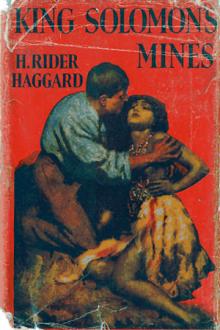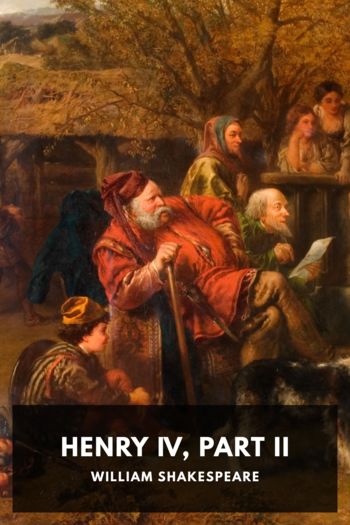King Solomon’s Mines, H. Rider Haggard [best mystery novels of all time TXT] 📗

- Author: H. Rider Haggard
Book online «King Solomon’s Mines, H. Rider Haggard [best mystery novels of all time TXT] 📗». Author H. Rider Haggard
The space in front of the large hut was empty, but before it were placed several stools. On three of these, at a sign from Infadoos, we seated ourselves, Umbopa standing behind us. As for Infadoos, he took up a position by the door of the hut. So we waited for ten minutes or more in the midst of a dead silence, but conscious that we were the object of the concentrated gaze of some eight thousand pairs of eyes. It was a somewhat trying ordeal, but we carried it off as best we could. At length the door of the hut opened, and a gigantic figure, with a splendid tiger-skin kaross flung over its shoulders, stepped out, followed by the boy Scragga, and what appeared to us to be a withered-up monkey, wrapped in a fur cloak. The figure seated itself upon a stool, Scragga took his stand behind it, and the withered-up monkey crept on all fours into the shade of the hut and squatted down.
Still there was silence.
Then the gigantic figure slipped off the kaross and stood up before us, a truly alarming spectacle. It was that of an enormous man with the most entirely repulsive countenance we had ever beheld. This man’s lips were as thick as a negro’s, the nose was flat, he had but one gleaming black eye, for the other was represented by a hollow in the face, and his whole expression was cruel and sensual to a degree. From the large head rose a magnificent plume of white ostrich feathers, his body was clad in a shirt of shining chain armour, whilst round the waist and right knee were the usual garnishes of white oxtail. In his right hand was a huge spear, about the neck a thick torque of gold, and bound on the forehead shone dully a single and enormous uncut diamond.
Still there was silence; but not for long. Presently the man, whom we rightly guessed to be the king, raised the great javelin in his hand. Instantly eight thousand spears were lifted in answer, and from eight thousand throats rang out the royal salute of “Koom!” Three times this was repeated, and each time the earth shook with the noise, that can only be compared to the deepest notes of thunder.
“Be humble, O people,” piped out a thin voice which seemed to come from the monkey in the shade, “it is the king.”
“It is the king,” boomed out the eight thousand throats in answer. “Be humble, O people, it is the king.”
Then there was silence again—dead silence. Presently, however, it was broken. A soldier on our left dropped his shield, which fell with a clatter on to the limestone flooring.
Twala turned his one cold eye in the direction of the noise.
“Come hither, thou,” he said, in a cold voice.
A fine young man stepped out of the ranks, and stood before him.
“It was thy shield that fell, thou awkward dog. Wilt thou make me a reproach in the eyes of these strangers from the Stars? What hast thou to say for thyself?”
We saw the poor fellow turn pale under his dusky skin.
“It was by chance, O Calf of the Black Cow,” he murmured.
“Then it is a chance for which thou must pay. Thou hast made me foolish; prepare for death.”
“I am the king’s ox,” was the low answer.
“Scragga,” roared the king, “let me see how thou canst use thy spear. Kill me this blundering fool.”
Scragga stepped forward with an ill-favoured grin, and lifted his spear. The poor victim covered his eyes with his hand and stood still. As for us, we were petrified with horror.
Once, twice, he waved the spear, and then struck, ah! right home—the spear stood out a foot behind the soldier’s back. He flung up his hands and dropped dead. From the multitude about us rose something like a murmur, it rolled round and round, and died away. The tragedy was finished; there lay the corpse, and we had not yet realised that it had been enacted. Sir Henry sprang up and swore a great oath, then, overpowered by the sense of silence, sat down again.
“The thrust was a good one,” said the king; “take him away.”
Four men stepped out of the ranks, and lifting the body of the murdered man, carried it thence.
“Cover up the bloodstains, cover them up,” piped out the thin voice that proceeded from the monkey-like figure; “the king’s word is spoken, the king’s doom is done!”
Thereupon a girl came forward from behind the hut, bearing a jar filled with powdered lime, which she scattered over the red mark, blotting it from sight.
Sir Henry meanwhile was boiling with rage at what had happened; indeed, it was with difficulty that we could keep him still.
“Sit down, for heaven’s sake,” I whispered; “our lives depend on it.”
He yielded and remained quiet.
Twala sat silent until the traces of the tragedy had been removed, then he addressed us.
“White people,” he said, “who come hither, whence I know not, and why I know not, greeting.”
“Greeting, Twala, King of the Kukuanas,” I answered.
“White people, whence come ye, and what seek ye?”
“We come from the Stars, ask us not how. We come to see this land.”
“Ye journey from far to see a little thing. And that man with you,” pointing to Umbopa, “does he also come from the Stars?”
“Even so; there are people of thy colour in the heavens above; but ask not of matters too high for thee, Twala the king.”
“Ye speak with a loud voice, people of the Stars,” Twala answered in a tone which I scarcely liked. “Remember that the Stars are far off, and ye are here. How if I make you as him whom they bore away?”
I laughed out loud, though there was little laughter in my heart.
“O king,” I said, “be careful, walk warily over hot stones, lest thou shouldst burn thy feet; hold the spear by the handle, lest thou should cut thy hands. Touch but one hair





Comments (0)